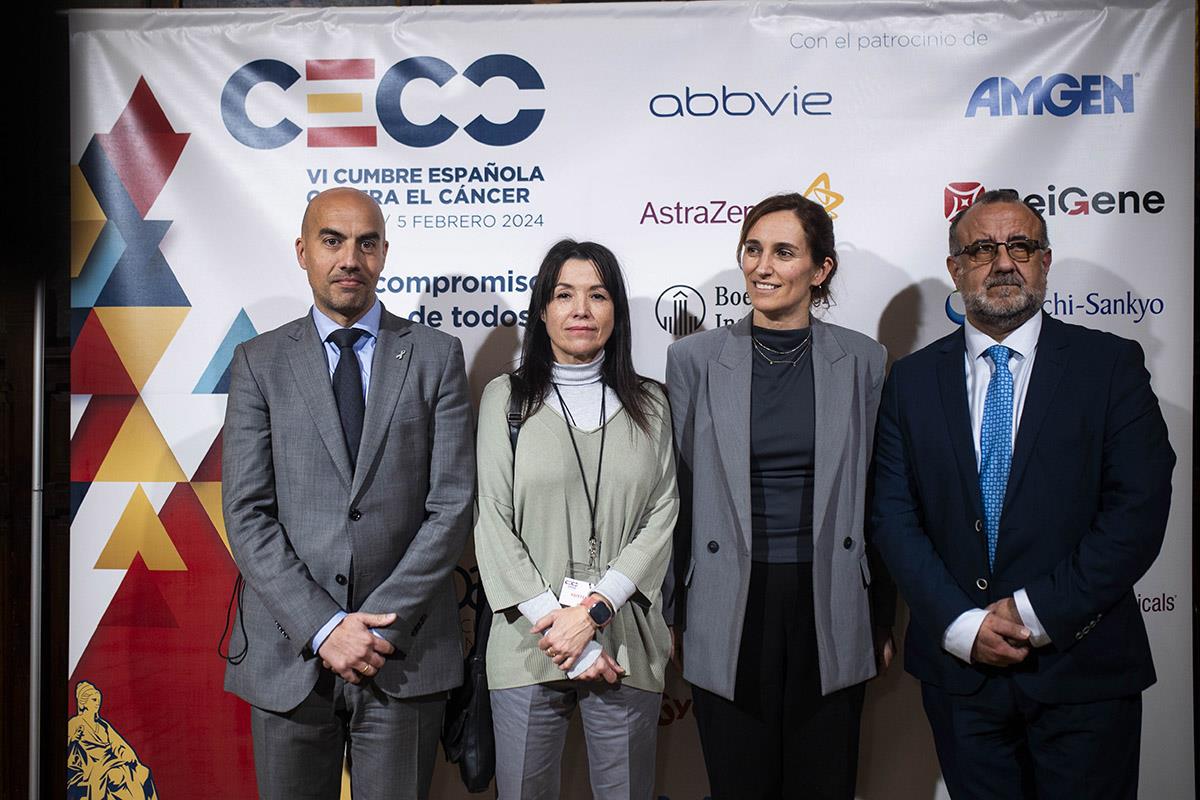Health will create a Cancer Surveillance System within the State Public Health Surveillance Network
News - 2024.2.5
 The Minister for Health, Mónica García, at the closing act of the Spanish Summit against Cancer
The Minister for Health, Mónica García, at the closing act of the Spanish Summit against Cancer
The Minister for Health, Mónica García, has announced the creation of the Cancer Surveillance System, which will harmonise the information currently available and coordinate cancer surveillance at the level of all the autonomous communities, thereby providing quality information on cancer to improve research and the evaluation of control and prevention programmes.
"Each and every one of the Government of Spain's actions in the fight against cancer has patients at the centre, and therefore their participation and collaboration is essential," she said. For this reason, the Ministry of Health's roadmap is to "prevent, screen, treat and care as much as possible, and from all sides".
This was stated after yesterday's celebration of World Cancer Day, and during the closing ceremony of the Spanish Summit against Cancer, organised by the Spanish Cancer Patient Group, where the minister recalled that "cancer represents a challenge that calls for the active participation of the whole of society, including governments, health authorities, professionals, experts and patients".
The Royal Decree that will create and regulate the State Public Health Surveillance Network, which will incorporate a Cancer Surveillance System, is expected to be approved this year,she said.
Mónica García said that the Government of Spain is committed to expanding and strengthening the National Health System to ensure that "all citizens have equal access to screening tests, affordable treatment, psychological care and a comprehensive care network, ensuring that patients and long-term survivors receive the cancer care they need".
She also stressed that the Ministry of Health is firmly committed to prioritising the recognition of the speciality of Genetics within Specialised Health Training. "The creation of this speciality, together with the implementation and expansion of the common catalogue of genetic tests, will allow us to improve our approach to cancer," said the minister.
At European level, after having approved the right to oncological oblivion, work is underway to approve the first EU Code of Conduct so that survivors can live free of stigma and discrimination on the basis of their medical history.
Challenges
The minister recalled the magnitude of the challenges ahead and the long road ahead. "Community collaboration, the transformative potential of genetic testing and the quest for equity in access to treatment were some of the central themes of the conversation and underscored our overarching goal: to save lives and improve the quality of life for patients, families and long-term survivors," she said.
In Spain, the incidence of cancer in 2040 is expected to reach 341,000 cases, and between 30% and 50% of these cases are preventable. "That is why the priority of the Ministry of Health and the Government of Spain is to tackle the disease by preventing risk factors, reducing social inequalities and increasing participation in screening," she said.
And on this path, it is essential to do away with the influence not only of the genetic code, but also of the postal code: "We know that cancer preys on people with lower income or educational levels, who in addition to having a lower participation in early detection programmes, have a higher exposure to risk factors such as unhealthy eating habits, pollution and alcohol and tobacco consumption," she explained.
For this reason, Mónica García considers that "we have a duty to tackle the fight against cancer in a multidisciplinary way, and this necessarily implies taking into account the impact of inequality, so that the people who suffer most from this disease are not left behind".
Thanks to the National Health System Cancer Strategy agreed with all the autonomous communities, and the European Plan to Combat Cancer, actions are being carried out to improve this comprehensive approach to primary prevention, screening, diagnosis, treatment and quality of life.
Smoking
At the same time, the Minister for Health indicated that it is necessary to take up the challenge of taking a step forward in the fight against smoking. "We know that tobacco is the most important preventable risk factor for cancer, and that it has a particular impact on those with lower socio-economic status," she stressed.
That is why Government of Spain is committed to being a pioneer in the battle against smoking, gaining more smoke-free spaces to protect non-smokers from so-called "second-hand smoke", and to guarantee more years of life and more years of better health.
Furthermore, the new smoking patterns, which are becoming the gateway to traditional tobacco addiction, especially among young people, are to be tackled as a priority. "These emerging practices require our immediate attention to prevent future generations of tobacco addicts," she said.
Non official translation




